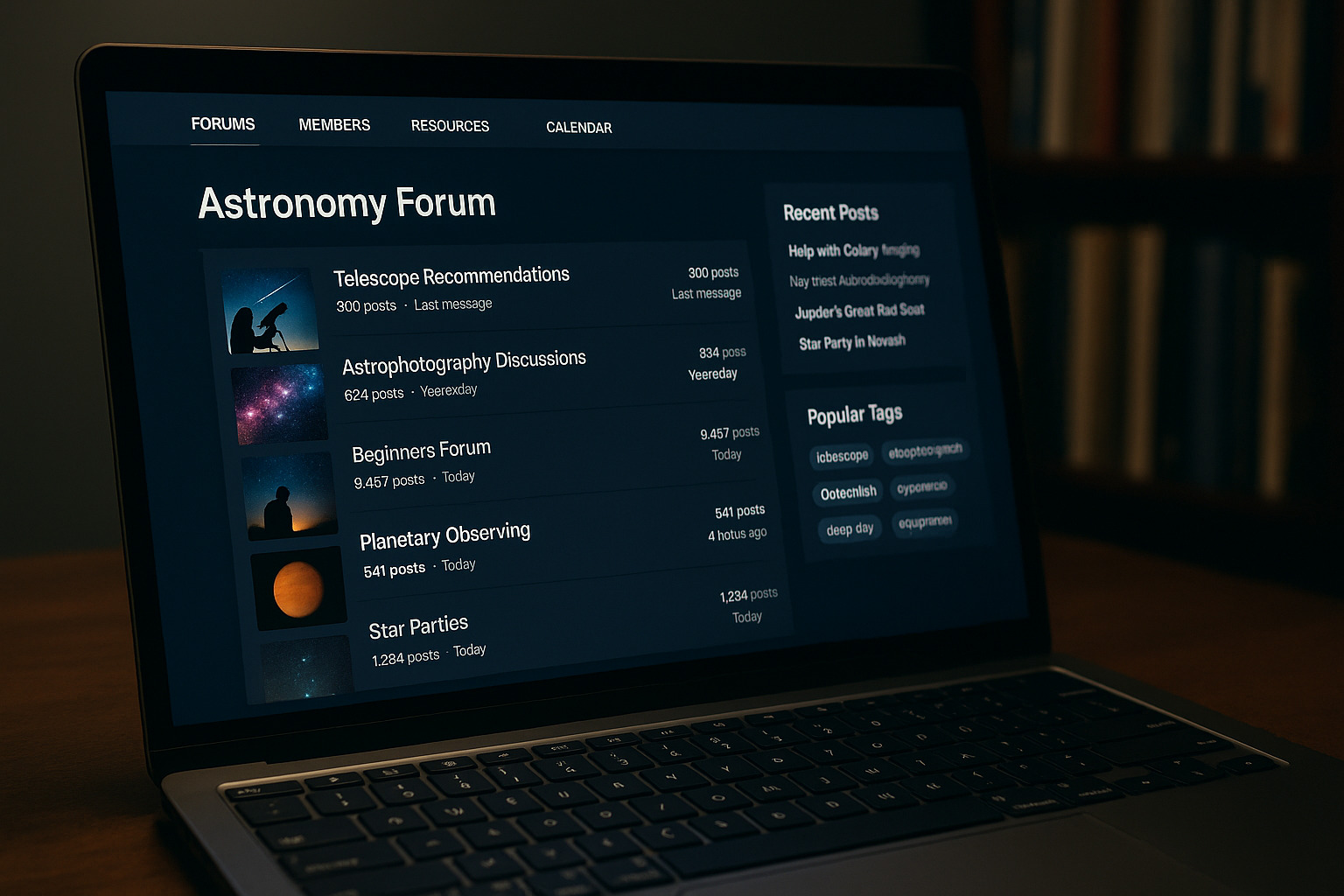Connecting with other astronomy enthusiasts can accelerate learning, spark inspiration, and provide valuable feedback on observations or astrophotography. The best online communities are those that mix technical discussions, helpful advice, and a welcoming atmosphere. Here are the most recommended forums and groups for 2025.
1. Cloudy Nights
Cloudy Nights remains one of the most trusted platforms for amateur and professional astronomers. The forum covers every aspect of astronomy, from choosing telescopes to advanced astrophotography processing. Its dedicated equipment reviews and observing reports make it an indispensable resource. Members often post detailed comparisons of eyepieces, mounts, and cameras, giving newcomers a solid base for purchasing decisions.
2. Stargazers Lounge
Stargazers Lounge continues to be highly active, particularly among UK-based astronomers, but its global reach has grown. Beginners are welcomed with step-by-step guidance, while experienced members contribute in-depth tutorials and observing logs. Sharing your astrophotography here can attract constructive criticism and collaboration. Many members now include a single bio link in their profiles to direct followers to their YouTube channels or Instagram accounts, making networking easier for content creators.
3. r/Astronomy
Reddit’s r/Astronomy is a massive community for news, space science discussions, and shared observations. Members frequently post high-resolution images of planetary events, lunar features, and deep-sky objects. Professional astronomers occasionally answer questions, creating a valuable mix of casual and technical conversation.
4. r/amateurastronomy
More focused on practical stargazing, r/amateurastronomy is ideal for hobbyists who want to share their backyard observing sessions. Users trade tips on affordable telescopes, collimation techniques, and seasonal star maps. The forum is beginner-friendly, with many posts detailing first-hand experiences of learning the night sky.
5. The Backyard Astronomy Space
This growing community offers a friendly environment for hobbyists who love simple backyard stargazing. Members share observation challenges, such as spotting Messier objects with binoculars. Its active event threads encourage group participation during meteor showers or eclipses.
6. Ice In Space
Primarily focused on the Southern Hemisphere, Ice In Space is essential for Australian and New Zealand astronomers. The forum provides detailed guides for southern constellations, equipment reviews, and astrophotography competitions. Its classified section for buying and selling gear is also popular.
7. Astromart
Astromart doubles as a discussion forum and marketplace for used astronomy equipment. Veteran astronomers frequently post reviews and observing tips, making it a reliable source of firsthand information. Serious buyers and sellers prefer Astromart because of its long-standing reputation for trustworthy transactions.
8. Spacecord
Spacecord combines traditional forums with modern chat-style interaction. Its real-time discussion rooms cover topics such as telescope maintenance, comet hunting, and spectroscopy. The mix of casual conversation and structured knowledge makes it appealing to younger astronomers.
9. The Planetary Society
Famous for its advocacy in planetary science, The Planetary Society’s online community brings together enthusiasts who care about space missions and exploration. Discussions range from Mars rover updates to citizen science projects. Membership grants access to exclusive webinars and Q&A sessions with experts.
10. Society for Popular Astronomy (SPA) Forum
The SPA Forum is one of the longest-running communities in the UK. Its strong focus on public education makes it a great place for beginners. Members regularly share observing tips, outreach ideas, and reports of bright comets or auroras visible from Europe.
11. Astronomical League
The Astronomical League is perfect for those who enjoy structured observing programs. Members can work through official challenges such as the Messier or Double Star programs, earning certificates for completed projects. The league’s online forums also provide guidance from experienced mentors.
12. American Association of Variable Star Observers (AAVSO)
The AAVSO is dedicated to the science of variable stars. Members contribute data to professional research, making it one of the best communities for citizen scientists. Its training materials and webinars teach photometry techniques, helping amateurs collect valuable observations.
13. Royal Astronomical Society (RAS)
The RAS community attracts serious enthusiasts and professionals alike. Discussions often focus on current research, academic papers, and conferences. Its online resources include lectures and publications, making it ideal for those who want to stay informed about cutting-edge astronomy.
Why Join These Communities
Each forum offers unique strengths, whether it’s detailed equipment reviews, professional-level discussions, or casual stargazing support. Engaging with multiple communities can provide diverse perspectives, from technical advice to creative inspiration. Sharing your observations, asking questions, and participating in events not only improves your skills but also connects you with a global network of passionate astronomers.
